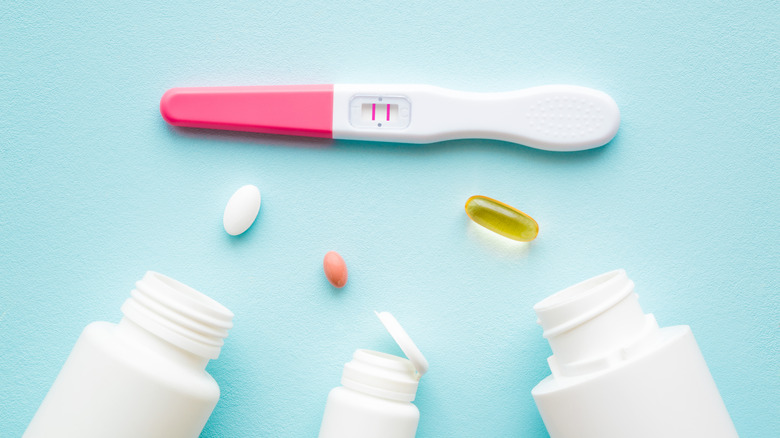What You Need To Know About Prenatal Vitamins Before Taking Them
Prenatal vitamins contain a wide range of nutrients and minerals that are designed to supplement a nutritionally adequate diet during the course of pregnancy, per the Mayo Clinic. These vitamins ensure that a pregnant woman does not have any nutritional deficiencies that could harm the growth and health of the developing fetus. A 2020 systemic review in the journal Nutrients found that ensuring adequate levels of vitamins and minerals during pregnancy is even more important because of increased nutritional demands during this period. The resulting meta-analysis showed that prenatal vitamins could even reduce the risks of certain pregnancy- and birth-related unfavorable outcomes, including maternal anemia and low birthweight.
While not all prenatal vitamins are created equally, WebMD outlines the general guidelines for micronutrient needs during pregnancy. On a daily basis, pregnant women will need 400 micrograms of folate, or folic acid, 10 milligrams of vitamin E, 400 IU of vitamin D, 70 milligrams of vitamin C, 17 milligrams of iron, 15 milligrams of zinc, and between 200 and 300 milligrams of calcium, among other vitamins and minerals. Before running out and grabbing a bottle of prenatal vitamins, however, there are some important things you should know.
Prenatal supplementation is critical for maternal and fetal health
When it comes to taking prenatal vitamins, many women believe they should start supplementing as soon as they get a positive pregnancy test. However, MindBodyGreen warns that the ideal time to start supplementing is before conception. Fetal development is already taking off between the time of conception and the moment the pregnancy test emits a positive result, and it's crucial that adequate vitamin and mineral levels are maintained during this time.
Furthermore, while prenatal vitamins are generally safe for all women, U.S. News & World Report points out that it's important to be aware of micronutrient upper limits. Too much iron and vitamin A, for example, can be harmful to the development of the fetus. Ensure you aren't ingesting more than 45 milligrams of iron and 5,000 IU of vitamin A per day. It is also important to note that the quality and safety of prenatal vitamins vary, depending on the brand. OB-GYN Dr. Scott Sullivan explains that "vitamins are largely unregulated. Many have plastics and lead in them. Many are mislabeled." Before choosing a prenatal vitamin, make sure to run it by your doctor first.
You should also be aware of the importance of continuing prenatal vitamins after birth (via U.S. News & World Report). OB-GYN Dr. Mazen Fouany says, "It's recommended to continue the vitamins after the delivery, especially if the mother is breastfeeding or has vitamin deficiency ..." Even when not breastfeeding, you can continue taking prenatal vitamins until six to 12 weeks following delivery.


